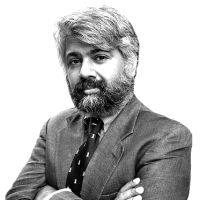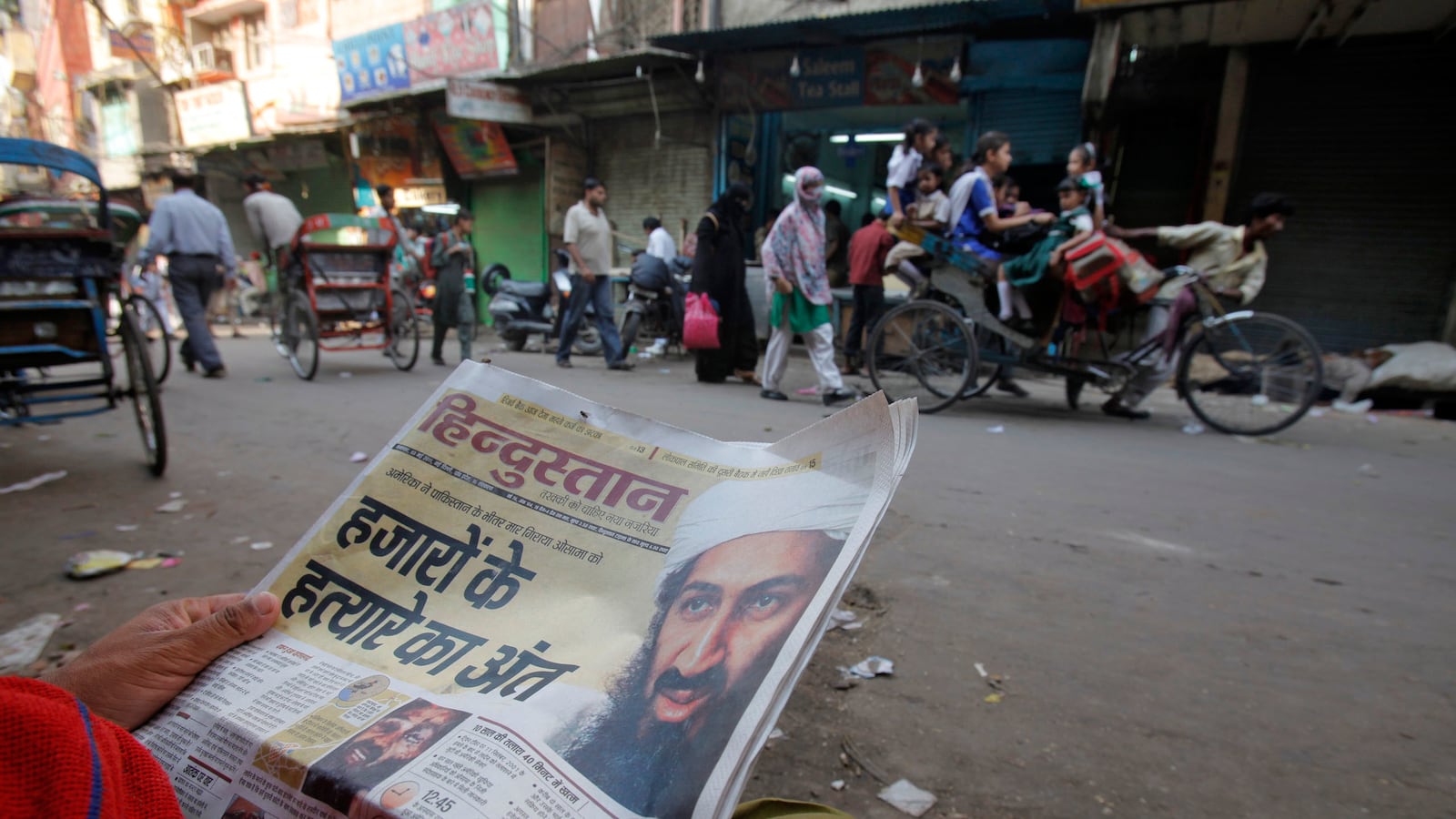Just a few days ago, India was in a relaxed, almost languid, state of mind. In a land normally beset by every imaginable hazard, the worst threat on the national horizon appeared to be nothing more than a “love jihad”, the squirming, wriggling brainchild of Hindu chauvinist agitators who rail against an imagined mass-seduction of Hindu women by predatory Muslim men (the aim being to marry and convert these women to Islam, and then to produce offspring with such ferocity that India’s 800 million-strong Hindu majority would, one day, be outnumbered by Muslims).
And then along came Ayman al-Zawahiri to distract India from this psychotic politico-sexual fantasy, threatening the country with real, no-nonsense jihad—the kind where evil men, armed to the teeth, vow mayhem on a scale far greater than anything that could be wrought by sweet words whispered into the ears of gullible Hindu maidens.
India awoke on Sept. 4 to a declaration by the supreme commander of al Qaeda of a new front for Islamist jihad: the Indian subcontinent. The Jamaat Qaidat al-jihad fi-shibhi al-qarrat al-Hindiya, or the Organization of al Qaeda’s Jihad in India, would focus, Zawahiri said, with a scattershot approach to geography, on the liberation of “Burma, Bangladesh, Assam, Gujarat, Ahmedabad, and Kashmir.” This was Zawahiri’s first video message to the world since August 2013, and was accessible on YouTube for about 24 hours before being taken down as a violation of the company’s “policy on violence”. Although al Qaeda has inveighed against India before—in 1996 (from the mouth of Osama bin Laden); 2001 (in a jihad manifesto); 2003 (Zawahiri’s first mention of India); and 2010 (Said al-Masri, Zawahiri’s deputy)—this was the first designation of India by al Qaeda as a primary theater of jihad. (Praveen Swami, India’s foremost investigative journalist on the subject of Islamist terror groups, wrote an invaluable analysis of the Zawahiri declaration in the Indian Express.)
What should we make of this call by Zawahiri, of this loveless jihad? Why has he made this declaration, and why now? After all, al Qaeda has been in Afghanistan for years; and therefore in Pakistan; and therefore available, already, for anti-India jihad.
Counterterrorism experts I spoke to were as one in pointing to the rise of ISIS in the Syria-Iraq theater as the main propulsion. ISIS has not merely stolen al Qaeda’s thunder; it is siphoning recruits away from the older organization, which has yet to recover from the catastrophic loss (in terms of charisma, and as a species of jihadi Lord Kitchener) of bin Laden. “Zawahiri wants you” doesn’t have quite the same impact on potential recruits as “Osama wants you.”
Gen. Ata Hasnain, a former Kashmir Corps commander in the Indian army, told me that before ISIS emerged as a jihadi force, al Qaeda “never felt the need to expand its ambit into South Asia. The anti-India terrorist groups in Pakistan were considered adequately motivated and organized, and al Qaeda preferred to remain only an inspiration for them, instead of overextending itself. Its prime battle was with Saudi Arabia and the U.S.” With the rise of ISIS, he said, al Qaeda has effectively been dwarfed. The avowal of jihad against India is its attempt to aggrandize itself anew.
Tricia Bacon, a professor at the American University in Washington, D.C., who worked on counterterrorism for a decade at the U.S. Department of State, pointed to another reason why Zawahiri has chosen to expand al Qaeda’s portfolio—the “Pakistanization” of al Qaeda. “Over the course of its years in Afghanistan and Pakistan, al Qaeda has endured many losses, and a number of its Arab members have left the region for Syria or other conflict zones as the security situation in Pakistan has deteriorated.” As a result, Bacon explained, “Al Qaeda has incorporated more Pakistanis into its ranks to fill these vacancies.” One salient example was Ilyas Kashmiri, one of the highest-ranking al Qaeda commanders. He is thought to have been killed in a drone operation in June 2011. (A colleague of Bacon’s, Steven Tankel, has written a fascinating paper on the extent to which al Qaeda has “gone native” in Pakistan. By last year, he reports, studies showed that “a plurality” of the videos produced by al Qaeda’s media wing focused on India and Pakistan; and, startlingly, Urdu, Pakistan’s national language, had supplanted Arabic as “the predominant language in al Qaeda propaganda releases.”)
Although al Qaeda is still a long way from having morphed into a Pakistani organization (with an Egyptian commander), it is clear that the once-largely Arab outfit has bulked up its sickly frame with Pakistani muscle, comprising both raw recruits and experienced militants. As the Americans depart Afghanistan, it is hard not to imagine Pakistani jihadis swooning to visions of 1989. In that year, the Soviets left Afghanistan, freeing up battle-hardened jihadis for holy war in Kashmir. Opportunities for violence will arise almost immediately, Gen. Hasnain points out, with elections scheduled later this year in the Indian state of Jammu and Kashmir.
What we are witnessing now is, potentially, a nightmare for India: the coming together (in purpose and objective, if not in operational structure) of al Qaeda and Pakistan’s Inter-Services Intelligence (ISI). While the two outfits have long enjoyed a marriage of convenience, they have been careful to maintain a distance from each other. The ISI is most comfortable working through jihadi groups of its own creation, many of which enjoy fraternal relations with al Qaeda. Al Qaeda, for its part, has never been entirely comfortable with governments in Islamabad, once dismissing Pervez Musharraf, the country’s erstwhile military dictator, as a puppet of the Hindus.
Suspicion of the ISI will persist within al Qaeda. According to Vappala Balachandran, a retired senior Indian intelligence officer and member of the two-man inquiry committee into the 2008 terrorist attack on Mumbai, “a highly trained terrorist organization like al Qaeda will never reveal all its secrets even to its closest allies. Zawahiri knows well that the ISI and the CIA have collaborated closely in the past, and that there may be remnants of the CIA’s moles in the ISI. Hence, while they could take indirect logistical help from the ISI—always through cut-outs [intermediaries who don’t know the identities of other persons in the espionage chain]—they will never reveal all their cards to them. They have layers and layers of cut-outs.”
The ISI is known to be unhappy that the global jihadi focus has shifted to Syria-Iraq on account of ISIS, and would like nothing better than to have a shift of emphasis (back) to Kashmir. So al Qaeda’s announcement of a new Indian front comes beautifully close to fulfilling the ISI’s Platonic ideal of jihad. A retired Indian ambassador told me that Zawahiri’s speech could easily have been scripted by the ISI, so perfect is it for the anti-India aims of Pakistan’s security establishment. A retired senior Pakistani diplomat said that his country’s intelligence is likely to believe that Zawahiri’s declaration would force India to talk on Kashmir with Pakistan. “That’s the way the ISI thinks.”
Prime Minister Nawaz Sharif is under siege, and has just been forced to share policy-making power with an army that refuses to countenance any meaningful rapprochement with India. Al Qaeda’s declaration of an India jihad allows for a reopening of jihad in Kashmir (and elsewhere in India) without obvious Pakistani authorship. (Pakistan-sponsored terrorism in India, on the other hand, could invite retaliation more easily from India, now led by an adamantly nationalist prime minister.) What’s more, Al Qaeda’s move positions it to attract many more Pakistani foot-soldiers to wage jihad against India, as well as to make a play for other disaffected Muslims in the Indian subcontinent. This is jihadi symbiosis of the sort that ISI dreams are made of.
One raw question remains: Will Indian Muslims heed Zawahiri’s call? The al Qaeda leader is gambling on the fact that the recent election of Narendra Modi—who has a history as a Hindu hardliner—will propel young Muslim men into al Qaeda’s embrace. To be sure, India’s Muslims, numbering a whopping 175 million, have been largely immune to jihadi culture. Headlines were made in India when four—repeat four—young men made their way to Iraq from Mumbai to fight with ISIS. Muslim leaders in India have been vehement in their denunciation of Zawahiri’s call to jihad. Dr. Zafarul Islam Khan, president of the All India Muslim Majlise Mushawarat, the apex body of Indian Muslim Organizations, said that Indian Muslims “do not require such meddling in their affairs by a foreign terrorist outfit.” He appealed to Indian Muslim youth to “chase away any dubious character trying to [propagandize] al Qaeda thoughts which do not belong to the enlightened and moderate mainstream Islam.” The Indian government’s drive for economic reform, here, assumes important security dimensions. A growing economy is a calming influence—for Hindus as much as for Muslims. India isn’t Iraq. It isn’t Syria. And it certainly isn’t Pakistan.





